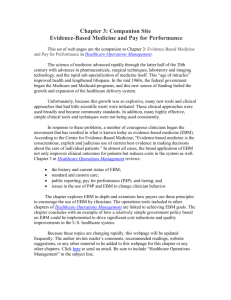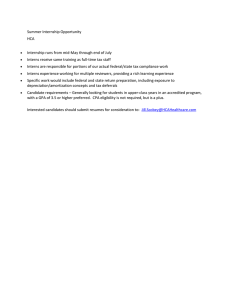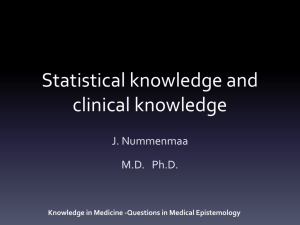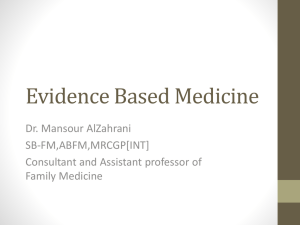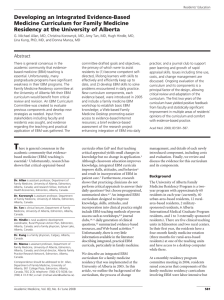Sample Evidence-Based Medicine Curriculum
advertisement
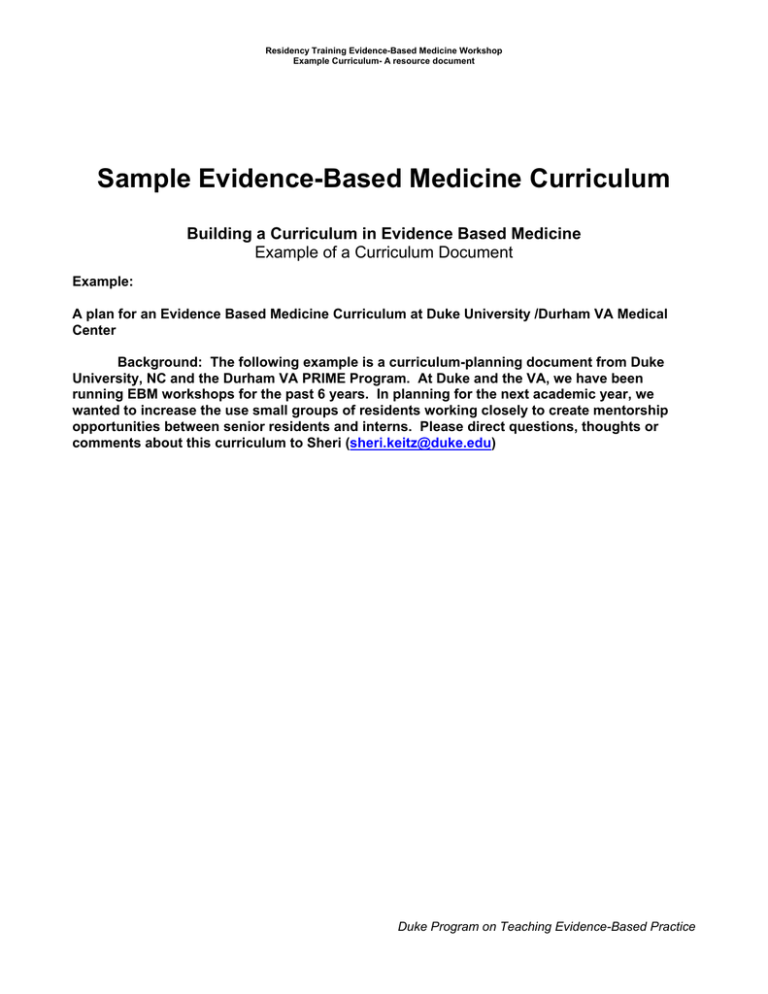
Residency Training Evidence-Based Medicine Workshop Example Curriculum- A resource document Sample Evidence-Based Medicine Curriculum Building a Curriculum in Evidence Based Medicine Example of a Curriculum Document Example: A plan for an Evidence Based Medicine Curriculum at Duke University /Durham VA Medical Center Background: The following example is a curriculum-planning document from Duke University, NC and the Durham VA PRIME Program. At Duke and the VA, we have been running EBM workshops for the past 6 years. In planning for the next academic year, we wanted to increase the use small groups of residents working closely to create mentorship opportunities between senior residents and interns. Please direct questions, thoughts or comments about this curriculum to Sheri (sheri.keitz@duke.edu) Duke Program on Teaching Evidence-Based Practice Residency Training Evidence-Based Medicine Workshop Example Curriculum- A resource document 1. General Needs Assessment: • General Goals of an EBM Curriculum: To implement a structured series of workshops to provide the fund of knowledge and skills necessary to incorporate best evidence in the care of individual patients • Current Workshop series is well received but not uniformly delivered to all Medicine House officers • We have limited faculty to teach the house officers- if we want to do more teaching, we will need the house officers to do it • Task: To Disseminate the Curriculum to all house officers over the course of the three year residency program using the residents to teach and mentor each other 2. Needs Assessment of Targeted Learners • INTERN Goals: • To Instruct them in Question Building and Basic Searching Skills • To provide role models and examples of EBM in practice • SECOND YEAR RESIDENT Goals: • To provide them with the teaching and leadership skills • To provide them with content and skills base to practice and teach EBM • To pair them with faculty mentors to co-teach sessions on EBM • THIRD YEAR RESIDENT Goals: • To allow them to teach and lead sessions on EBM independently • To give them the opportunity to be role models and mentors for interns 3. Formulation of Broad Curricular Goals • Interns will be exposed to question building and searching skills in two large group sessions (60 minutes each) lead by faculty • Interns will practice the EBM exercise in workshops lead by SECOND YEAR RESIDENTS and THIRD YEAR RESIDENTS (60 - 90 minute sessions) • SECOND YEAR RESIDENTS will be paired with faculty mentors on their Ambulatory Block Time and each will co-lead one EBM session and participate in the sessions lead by their peers. • THIRD YEAR RESIDENTS will participate in learning teams with interns and each will lead one EBM session and participate in the sessions lead by their peers. 4. Specific Measurable Objectives • All workshops will focus on the Competencies needed for the Practice of Evidence-Based Medicine (See Table) • Objectives of all Workshops: After completing this workshop you should be able to 1. Create a pertinent answerable question from a clinical case scenario 2. Plan and carry out a directed Medline search that produces the articles to be discussed concerning the topic being discussed 3. Determine whether the article(s) give us valid information concerning the question at hand. 4. Determine whether the results are applicable to the patient in “your practice” case Duke Program on Teaching Evidence-Based Practice Residency Training Evidence-Based Medicine Workshop Example Curriculum- A resource document 5. Educational Strategies • Case Based Learning • Interactive Workshops • The Creation of Learning Teams ( groups of SENIOR RESIDENTS and INTERNS) • Train the trainer (Faculty training the senior house officers to teach the interns) 6. Implementation of the Curriculum Part I: Two didactic Sessions for interns: Question Building and Medline Searching Part II: The Creation of Learning Teams: 8 Teams (7 THIRD YEAR RESIDENTS, 7 Interns) who will work together for the entire year 7 Workshop Sessions over the course of the year: Each Workshop Topic has a faculty member as “Content Leader” Therapy Diagnosis Evidence-Based Physical Exam Prognosis Harm Systematic Review Cost-Effectiveness Analysis Content Leader’s Job: To meet with the 7 THIRD YEAR RESIDENTS who are scheduled to lead the Learning Teams and prepare them to teach that topic Session Facilitators: 1 Faculty Facilitator for 2 Learning Teams. The job of the session facilitator is to problem solve during the sessions, to keep people running on time and to gather the two groups together for a 10 minute wrap up at the end of each session. Part III: Modification of Current EBM Workshops during Ambulatory Block time to create co-teachers (faculty + SECOND YEAR RESIDENT). These sessions will continue to be very structured sessions with significant faculty input and direction. 7. Evaluation and Feedback • Quality Improvement • Objective Measures of Learners skills, knowledge and attitudes • We will consider the development of case based evaluations Duke Program on Teaching Evidence-Based Practice
